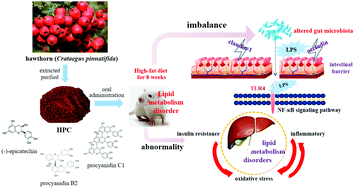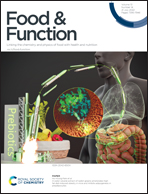Procyanidins from hawthorn (Crataegus pinnatifida) alleviate lipid metabolism disorder via inhibiting insulin resistance and oxidative stress, normalizing the gut microbiota structure and intestinal barrier, and further suppressing hepatic inflammation and lipid accumulation†
Abstract
Recently, lipid metabolism disorder (LMD) has been regarded as a risk factor leading to multiple diseases and affecting human health. Procyanidins have been reported to be a potential therapy for LMD. This study explored the effect and possible mechanism of procyanidins from hawthorn (HPC) in LMD rats fed a high-fat diet. HPC supplementation for 8 weeks significantly relieved lipid accumulation in the serum and liver, and protected the structure of liver in LMD rats. The amelioration of insulin resistance, lipid metabolism related hormones and oxidative stress was also found. Moreover, HPC also regulated the structure of gut microbiota, especially increased the abundances of Akkermansia, Bacteroides and Adlercreutzia, and decreased Lactobacillus, Bifidobacterium, Blautia, Lachnospiraceae and Subdoligranulum. Additionally, HPC enriched genes were involved in the fatty acid biosynthesis, MAPK, and lipopolysaccharide biosynthesis pathways. We found a high LPS level due to the microbiome disorder induced by the high-fat diet, and then western blot results showed that HPC maintained the intestinal barrier and mitigated inflammation and lipid accumulation in the liver via regulating the NF-κB and AMPK pathways, which were related to LMD. This study provided new insights into dietary intervention based on HPC to alleviate LMD via stabilizing the gut–liver axis.



 Please wait while we load your content...
Please wait while we load your content...